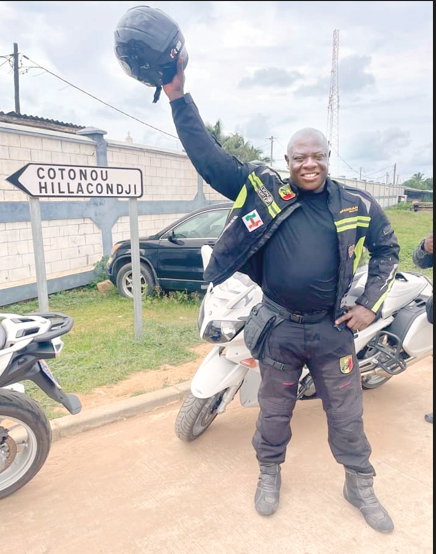Africa’s anti-polio warrior rides 13,000km to raise awareness
By Samuel Kariuki, July 24, 2023Nigerian motorcycle rider Kunle Adeyanju is not just enthusiastic about visiting new places with his bike, but he is also focused on going on adventure to change a narrative.
For long, children who have not been vaccinated against polio suffer from paralysis which is the most severe symptom associated with poliovirus and it can lead to permanent disability and death.
Adeyanju jetted into Nairobi last week to tell his version of the story about the disease his childhood friend contracted at an early age, which eventually led to his death.
After his friend’s death, he resolved to embark on an intercontinental ride to raise awareness about the devastating effects and to call for its global eradication.
According to Adeyanju, Sanju (his friend) had suffered a bout of polio that left him paralyzed and wheelchair-bound. Sanju could, therefore, not play with him and used to watch on the sidelines cheering him as he honed his football skills.
“Despite his tragedy, he cheered us on wholeheartedly. When he passed away two years ago, I vowed to do whatever I could so that no other child have to go through the same painful experience as Sanjo,” Adeyanju said.
In April last year, the rider decided to venture out on a journey that lasted him 41 days as he rode some 13,000 kilometres through 11 countries and 31 cities.
The 44-year-old departed from London, UK on 19th April travelling through France, Spain, Morocco, Mauritania, Senegal, Mali, Burkina Faso, Cotẽ D’Ivoire, Ghana, Togo, Benin and ended in Lagos, Nigeria.
His aim was to raise money to support Rotary International’s global polio eradication efforts and to raise awareness of the disease.
The trip was characterised by the chilling weather of the European Alps and the scorching sun of the Sahara Desert commencing in London and ending in Nigeria. Adeyanju recounted that the terrain was dangerous and torturous.
He said that while traversing through France and Spain, he was rained on heavily for over a distance of 1,200km adding he crossed the Sahara Desert which was the toughest section of his trip in seven days where he rode 1,000km per day.
“The Sahara is a hostile environment,” he said. “It’s not designed to support life. In Sahara, you can easily die. It is unforgiving. A slight mistake and you may not survive.”
Adeyanju said that while in Morocco, he experienced severe sandstorms twice each lasting between 30-40 minutes where at some point he was forced to lay the bike down and lie face down for 30 minutes until the storm passed.
Further into his journey, he almost collapsed due to dehydration after running out of water yet he had a distance of about 450km to cover.
With his mouth too dry even to utter a word, desert tourists who saw him struggling came to his rescue and offered him some water.
“Some guys were on a desert Safari. I signaled them since I couldn’t speak. One of them said ‘Don’t talk, don’t talk’. I guess he had spotted me from afar and had sensed I was in a problem. Then, he went into his car and brought me two one-and-half-litre bottles of water,” he recalled.
After documenting his trip on social media, Adeyanju has attracted many well-wishers who have donated money towards his initiative of eradicating polio.
He has also received accolades from high-profile personalities, including billionaire Bill Gates who termed his trip “incredible”.
“This final phase of polio eradication will be the most difficult, but we also know it is achievable, and we have the collective strength to finish the job,” Adeyanju said.
According to World Health Organisation (WHO), polio is a highly infectious viral disease that can cause irreversible paralysis.
In 2022, 84 per cent of infants around the world received three doses of the polio vaccine where in the same year, the coverage of infants receiving their first dose of inactivated polio vaccine (IPV) in countries that are still using oral polio vaccine (OPV) is estimated at the same percentage.
According to WHO polio has been stopped in all countries except for Afghanistan and Pakistan warning that until poliovirus transmission is interrupted in these countries, all countries remain at risk of importation of polio, especially vulnerable countries with weak public health and immunization services and travel or trade links to endemic countries.
Despite Kenya eradicating polio in 2014, the Ministry of Health in February flagged five counties including Turkana, West Pokot, Wajir, Mandera, and Garissa as being at risk of Polio outbreak due to low uptake of childhood immunisation.
The outbreak of polio in those areas, the Ministry said, would be due to low immunity among children who missed out on jabs.
Though Africa was certified wild poliovirus-free in August 2020, the disease was recently reported in Malawi and Mozambique.
